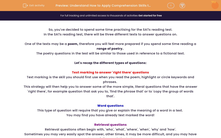So, you've decided to spend some time practising for the SATs reading test.
In the test, there will be three different texts to answer questions on.
One of the texts may be a poem, therefore you will feel more prepared if you spend some time reading a range of poetry.
The poetry questions in the test will be similar to those used in reference to a fictional text.
Let's recap on the different types of questions:
Text marking to answer 'right there' questions
Text marking is the skill you should first use when you read the poem - highlight or circle keywords and phrases.
This strategy will help you to answer some of the more simple, literal questions that have the answer 'right there', for example, questions that ask you to 'Find the phrase' or to 'Copy the group of words'.
Word questions
This type of question will require you to give or explain the meaning of a word in a text.
You may find you have already text marked the word!
Retrieval questions
Retrieval questions often begin with who, what, where, when, why and how.
Sometimes you may very easily spot the answer, other times, it may be more difficult, and you may have to carefully search the text.
Although it can be tempting, do not guess. Always carefully check the answer, by finding evidence in the text.
Inference questions
To answer an inference question, you will need to look for clues.
You will need to prove your answer by asking yourself what evidence there is to support a particular claim? How do you know a certain statement to be true?
Use 'because' in your answer to demonstrate the evidence you have identified in the text.
Look carefully at the number of marks available for the question, two marks mean two pieces of evidence are needed. Three marks mean three pieces of evidence required and so on.

Right, now it's over to you now to answer a range of questions based on 'Daffodils' by William Wordsworth, published in 1807.
You should always refer to your own text when working through these examples. These quotations are for reference only.







